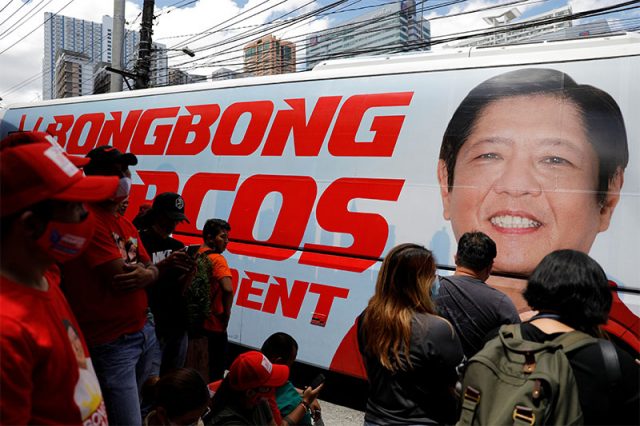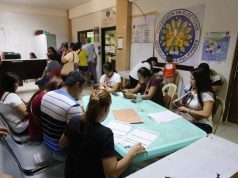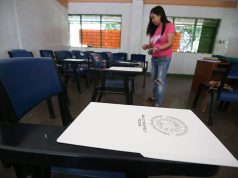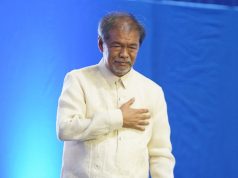
MANILA — Ferdinand “Bongbong” Marcos Jr. was 28 years old when a helicopter whisked his family from the Philippines’ presidential palace as millions of protesters demanded the ouster of his dictator father in a historic “people power” revolution.
Just over 36 years later, the son is celebrating a landslide victory in a presidential election, an extraordinary comeback for a family once best known for widespread human rights abuses and the plunder of an estimated $10 billion.
Marcos’ share of the vote from Monday’s election was double that of his nearest rival according to an unofficial election commission tally. The results – largely deemed legitimate, unlike the last election held during his father’s martial law rule – left some of the original people power activists dejected and confused.
“We said in 1986, ‘Never again’,” said Florencio Abad, who was among the millions of protesters who swarmed the streets of Manila back then and later became a member of the cabinet. “How did they manage to come back?”
The Marcos family has waged a decades-long campaign to resurrect its reputation. That, plus the shortcomings of successive governments and a political masterstroke in aligning with the daughter of current President Rodrigo Duterte, helped fuel their once-unthinkable return to the presidency.
Sara Duterte-Carpio has an insurmountable lead in the election for vice president, which is run separately, according to the unofficial count.
“I would not have believed this in 1986 or even 1995,” said Joshua Kurlantzick, a Southeast Asia analyst at the New York-based Council on Foreign Relations.
Since the late 1990s, the Philippines has seen a succession of ineffective and corrupt governments, Kurlantzick said, which led to the rule of Duterte, who he described as a “a semi-autocrat”.
“The idea of strongman rule is again very popular, including with young people”.
The Marcos family was allowed to return to the Philippines in 1991 by then-President Corazon Aquino, whose husband’s assassination in 1983 helped trigger the People Power movement that eventually ousted the elder Marcos after 20 years in power.
Allowing the family to return from exile after the senior Marcos died was an act of “extraordinary generosity”, according to David Chaikin, a researcher at the University of Sydney.
“This was the beginning of the Marcos family clawing their way to power,” he said.
‘New generation of voters’
Both Marcos Jr. and his mother Imelda quickly moved back into politics, rebuilding their political networks as they fought scores of cases to recover the family’s wealth. The family has maintained their fortune was legitimately obtained despite the small salaries Marcos Sr. and Imelda Marcos earned during his presidency.
READ: Marcos could control hunt for family’s wealth as Philippines president
Imelda Marcos was elected to congress for four terms. Meanwhile, her son spent 21 years in public office, serving in congress and as governor of the family’s stronghold in the province of Ilocos Norte. He unsuccessfully ran for vice president in 2016.
The high-profile political roles of the Marcoses – Marcos’ sister, Imee, is a senator – was augmented by a well-tuned social media campaign downplaying the human rights abuses and corruption during their father’s reign and calling it a “golden age’ of economic prosperity and infrastructure building.
The Philippines recorded strong growth during much of the 1970s but its fortunes plummeted in the early 1980s as debt and global interest rates soared, economists have said. The economy contracted almost 15% in the last two years of the Marcos administration, according to World Bank data.
With half of voters aged between 18 and 40, the social media campaign found a receptive audience.
“This is also a new generation of voters,” said Patricio Abinales, a Filipino and professor of Asian studies at the University of Hawaii-Manoa. “None lived through the Marcos and post-Marcos eras.”
Voter support for Marcos doubled in November when Duterte-Carpio announced she would be his running mate, according to pollster Pulse Asia.
The people power protester Abad – who served in cabinet positions under President Corazon Aquino and also her son, President Benigno “Noynoy” Aquino – said post-1986 governments were unable to reverse the injustices of the Marcos era.
“The changes that happened were not deep enough … particularly addressing the problem of inequity and the exclusion of so many Filipinos from the distribution of wealth in the country,” he said.
“There is justifiable disappointment.”
Alongside Marcos Jr., other clan members have also won elections, by unofficial count. His son Sandro looks set to be a member of House of Representatives, his sister Imee’s son Matthew Manotoc is likely to be reinstated as governor of Ilocos Norte province, another relative as vice-governor, and another as mayor of Laoag City, the provincial capital.
RELATED: Marcos rule to return to Philippines after election landslide
—Reporting by Karen Lema and Tom Allard; Additional reporting by Poppy McPherson, Neil Jerome Morales and Kay Johnson; Editing by Raju Gopalakrishnan









